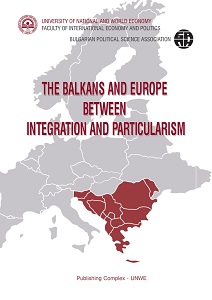The European Integration Crisis: Causes and Consequences
The European Integration Crisis: Causes and Consequences
Author(s): Diana Yarosh
Subject(s): Politics / Political Sciences, Politics, Political Theory, Politics and society, EU-Approach / EU-Accession / EU-Development, Fiscal Politics / Budgeting
Published by: Университет за национално и световно стопанство (УНСС)
Keywords: European Union; enlargement; financial crisis; democratic deficit; political parties; migration
Summary/Abstract: Historically the European Union was relatively successful, especially for the original purpose of ensuring peace in Europe. Nowadays, however, many of the stakeholders, particularly from within, are becoming increasingly critical of the Union calling into question its future. The purpose of this research is to provide an overview and analyse factors commonly perceived as indicative of the decline of the European Union with an attempt at distinguishing between causes and consequences and singling out factors underlying current internal tensions. The findings suggest that the fundamental cause of struggle lies in the enlargements of 1985 and the ones that occurred after 2000. The acceptance of new members not sufficiently aligned regarding both the economy and political culture resulted in growing internal tensions, which escalated further in the face of additional pressures such as the financial and the refugee crises. Structural weakness and inability to organise democratic process at European level has made the accommodation of new members more problematic.
Book: The Balkans and Europe between Integration and Particularism
- Page Range: 47-59
- Page Count: 13
- Publication Year: 2019
- Language: English
- Content File-PDF

